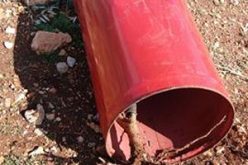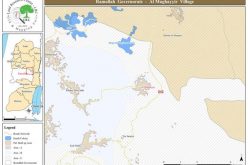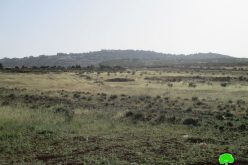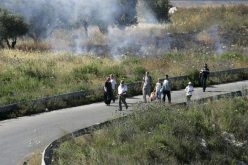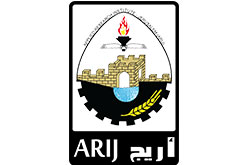Israeli Occupation Forces destroy 40 olive trees to open colonial road for Mizpe Yashai outpost
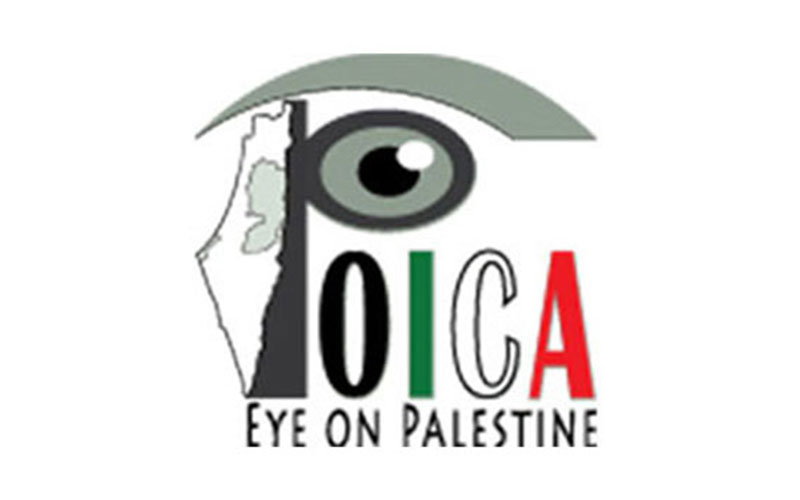
- Violation: ravaging lands and uprooting trees
- Location: Kfar Qaddum- Qalqiliya governorate
- Date: May 08, 2016
- Perpetrators: colonists of Kedumim and Mizpe Yashai
- Victims:
Details:
Israeli Occupation Forces ravaged on May 08, 2016 an olive grove killing 40 fruitful trees in order to open a colonial road that links the outpost of Mizpe Yashai to the bypass road number 60, southeast Kfar Qaddum village.
This step came after the Israeli occupation authorities served the military number ) T/22/10) on the plot, in which the olive trees are planted. Noteworthy, the order was found by chance by farmers of the area.
The order stated the confiscation of 3.5 dunums from Kfar Qaddum, more specifically from the natural block number 10 on the claim of "Security Purposes", which later on turned out to be for the sake of opening a road to serve the nearby colony.
It should be marked that uprooted trees belong to the following people:
- Nidal Aqil: seven trees
- Mohammad Ishteiwi: four trees
- Jum'a Barham: thirteen trees
- Ata Ishteiwi: nine trees
- Hisham Barham : eight trees
Photos 1+2: the outpost of Mizpe Yashai with a view of the new road
The order to open the road in Kedumim colony
It should be marked that the outpost of Mizpe Yashai is relative to Kedumim colonies bloc that was founded in the nineties. This bloc created a de facto on the ground through seizing and confiscating Palestinian lands.
Land Research Center sees land confiscation as a flagrant violation of Human Rights and all international laws and conventions, which prohibit disposition of public properties in occupied countries.
UN Security Council resolutions in regard to Israeli colonies:
UN Security Council resolution 446, article 3 " Calls once more upon Israel, as the occupying Power, to abide scrupulously by the 1949 Fourth Geneva Convention, to rescind its previous measures and to desist from taking any action which would result in changing the legal status and geographical nature and materially affecting the demographic composition of the Arab territories occupied since 1967, including Jerusalem, and, in particular, not to transfer parts of its own civilian population into the occupied Arab territories;"
- Un Security Council resolution 452, article 3"Calls upon the Government and people of Israel to cease, on an urgent basis, the establishment, construction and planning of settlements in the Arab territories occupied since 1967, including Jerusalem;"
- Un Security Council resolution 465, Strongly deplores the continuation and persistence of Israel in pursuing those policies and practices and calls upon the Government and people of Israel to rescind those measures, to dismantle the existing settlements and in particular to cease, on an urgent basis, the establishment, construction and planning of settlements in the Arab territories occupied since 1967, including Jerusalem;
Calls upon all States not to provide Israel with any assistance to be used specifically in connexion with settlements in the occupied territories;
-
Un Security Council resolution 242, Affirms that the fulfilment of Charter principles requires the establishment of a just and lasting peace in the Middle East which should include the application of both the following principles:
(i) Withdrawal of Israel armed forces from territories occupied in the recent conflict;
(ii) Termination of all claims or states of belligerency and respect for and acknowledgment of the sovereignty, territorial integrity and political independence of every State in the area and their right to live in peace within secure and recognized boundaries free from threats or acts of force;
Convention (IV) respecting the Laws and Customs of War on Land and its annex: Regulations concerning the Laws and Customs of War on Land. The Hague, 18 October 1907.
Article 46. Private property cannot be confiscated.
Article 55: The occupying State shall be regarded only as administrator and usufructuary of public buildings, real estate, forests, and agricultural estates belonging to the hostile State, and situated in the occupied country. It must safeguard the capital of these properties, and administer them in accordance with the rules of usufruct.
-
Art. 147. Grave breaches to which the preceding Article relates shall be those involving any of the following acts, if committed against persons or
property protected by the present Convention: wilful killing, torture or inhuman treatment, including biological experiments, wilfully causing great suffering or serious injury to body or health, unlawful deportation or transfer or unlawful confinement of a protected person, compelling a protected person to serve in the forces of a hostile Power, or wilfully depriving a protected person of the rights of fair and regular trial prescribed in the present Convention, taking of hostages and extensive destruction and appropriation of property, not justified by military necessity and carried out unlawfully and wantonly.
Prepared by
The Land Research Center
LRC









